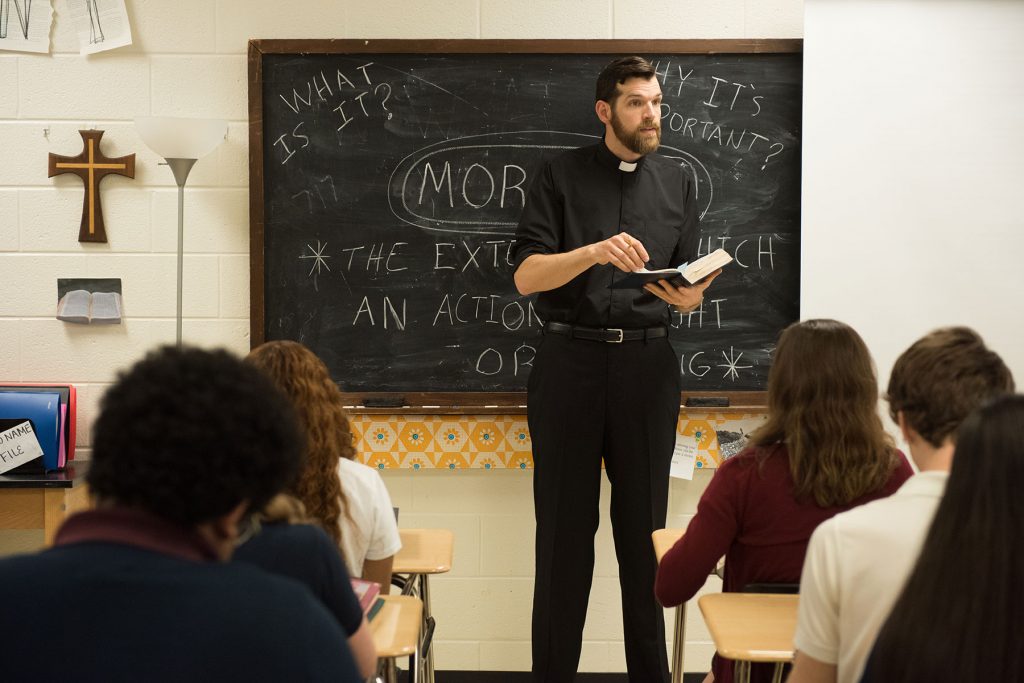In Yes, God, Yes, a smart 2017 short film about sexuality and religious guilt partly loses its message when stretched over 87 minutes in a full length feature.
Karen Maine’s 2017 short film about a Catholic teenager who faces religious guilt when discovering masturbation for the first time is an excellent drama. In a little over eleven minutes, Yes, God, Yes (2017) introduces us to a likeable protagonist, approaches underdiscussed topics with intelligence and raises all the right questions with the perfect amont of tact and irony. Still available to watch on Bluefever, Maine’s short film is an investigation on religion and hypocrisy that sheds light on the effects of certain problematic approaches taken by Catholic schools when dealing with sin and sexuality. It comes as no surprise that it has been watched over 1.5 million times since its release: thanks to an excellent screenplay and Natalia Dyer (Stranger Things)’s charisma, Yes, God, Yes (2017) is a meaningful, charming drama that ultimately sends across a message of self-love, growth and acceptance. As a short film, Yes, God Yes knows exactly what it wants to be. Unfortunately, the same cannot be said of its feature-length transposition.
Set in an era of old Nokia phones and AOL chats, Yes, God, Yes (2020) starts from the same premise as its predecessor: Alice (Natalia Dyer) is a sixteen-year-old girl trying her best to be a good Christian, at least according to the rules established by the very strict Catholic high school she goes to. At Alice’s school, the rigid Mrs Veda (Donna Lynne Champlin) patrols corridors Dolores Umbridge-style, confiscating chewing-gum, measuring skirt lengths and imposing the right punishment for each infraction. Father Murphy (Timothy Simons) teaches classes about sexual abstinence, explaining to his pupils, among other things, that “guys are like microwave ovens” who only “need a few seconds to get switched on”, while ladies need to “preheat for a while”, and that the only purpose of sex is to procreate.
Alice also happens to have just discovered masturbation, during an AOL chat that started innocently but soon turned into something else entirely, when “hairychest956” sent her mildly racy pictures in an attempt to have cyber sex with her. According to Father Murphy, “sex with ourselves” is a sin that leads to “damnation for all eternity”, and Alice is overwhelmed with guilt over thoughts she cannot control. When she attends a mysterious Catholic youth retreat, she becomes even more confused, as she develops a crush for the star of the football team (Chris, played by Wolfgang Novogratz), and the struggles to suppress her urges increase.

If Yes, God, Yes (2020) starts from a compelling premise, made even more so by Natalia Dyer’s natural charm and magnetic screen presence, it is in its frequent use of exaggeration to depict its characters and scenarios that the film loses its appeal, which really is a shame. Maine’s feature-length drama presents us with clichéd, overly stereotyped protagonists engaging in behaviour that is too unrealistic to have the desired effect. For instance, the 2017 short showed a conflicted Alice earnestly asking her teacher/priest for advice on whether or not she should take communion if she hasn’t confessed all her sins: this is a critical yet respectful analysis of the preachings of Catholic religion, with the director’s message clearly and effectively coming across thanks to a clever screenplay and good editing.
Instead, the 2020 film presents us with a way hotter, Fleabag-reminiscent priest masturbating to a porn movie while away on a religious retreat, with Alice as an arm hair fetishist who witnesses this and many other “immoral” acts involving her schoolmates and teachers, who judge her and punish her instead of believing her. Instead of highlighting the need for more communication between teenagers and educators, Yes, God, Yes revels in its meanness towards its protagonist, with scenarios that are either too over the top to be taken seriously or not bizarre enough to offer comic relief.
Perhaps the film’s greatest flaw is that it attempts to incorporate too many themes at once – from sex and masturbation to religion and sin to the kind of bullying and backstabbing that teenagers are often subjected to. As a result, this promising drama tries really hard to make several points, but fails at sending most of them across in a truly effective way. This becomes quite evident from the fact that, while Yes, God, Yes (2017)’s message can be grasped simply by watching the action unfold, Yes, God, Yes (2020)’s only real insight comes from a biker lady at a bar who makes a sudden and random appearance in Alice’s life. “Nobody knows what they’re doing no more than the rest of us”, the biker lady tells Alice after giving her an impromptu lesson on Catholic guilt, explicitly revealing that very same message of acceptance that would (and should) have been self-explanatory in a more focused film.
Yes, God, Yes is a well-meaning drama with a compelling premise that attempts to tackle many complex, underdiscussed themes with humour and charm and only partially manages to send its message across. Yet, the film is still worth watching for Natalia Dyer’s impressive performance, and for its ironic depiction of Catholic retreat dynamics that are bound to spark recognition in many viewers.
Yes, God, Yes is now available to watch on digital and on demand.

